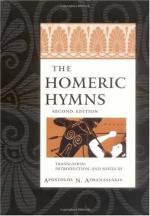The origins of Aphrodite, unlike the origins of Apollo, cannot be found in a state of low savagery. She is a departmental Goddess, and as such, as ruling a province of human passion, she belongs to a late development of religion. To Christianity she was a scandal, one of the scandals which are absent from the most primitive of surviving creeds. Polytheism, as if of set purpose, puts every conceivable aspect of life, good or bad, under divine sanction. This is much less the case in the religion of the very backward races. We do not know historically, what the germs of religion were; if we look at the most archaic examples, for instance in Australia or the Andaman Islands, we find neither sacrifice nor departmental deities.
Religion there is mainly a belief in a primal Being, not necessarily conceived as spiritual, but rather as an undying magnified Man, of indefinitely extensive powers. He dwells above “the vaulted sky beyond which lies the mysterious home of that great and powerful Being, who is Bunjil, Baiame, or Daramulun in different tribal languages, but who in all is known by a name the equivalent of the only one used by the Kurnai, which is Mungan-ngaur, or ‘Our Father.’” {45} This Father is conceived of in some places as “a very great old man with a long beard,” enthroned on, or growing into, a crystal throne. Often he is served by a son or sons (Apollo, Hermes), frequently regarded as spiritually begotten; elsewhere, looked on as the son of the wife of the deity, and as father of the tribe. {46a} Scandals connected with fatherhood, amorous intrigues so abundant in Greek mythology, are usually not reported among the lowest races. In one known case, the deity, Pundjel or Bunjil, takes the wives of Karween, who is changed into a crane. {46b} This is one of the many savage aetiological myths which account for the peculiarities of animals as a result of metamorphosis, in the manner of Ovid. It has been connected with the legend of Bunjil, who is thus envisaged, not as “Our Father” beyond the vault of heaven, who still inspires poets, {46c} but as a wandering, shape-shifting medicine-man. Zeus, the Heavenly Father, of course appears times without number in the same contradictory aspect.
But such anecdotes are either not common, or are not frequently reported, in the faiths of the most archaic of known races. Much more frequently we find the totemistic conception. All the kindreds with animal names (why adopted we do not know) are apt to explain these designations by descent from the animals selected, or by metamorphosis of the primal beasts into men. This collides with the other notions of descent from, or creation or manufacture out of clay, by the primal Being, “Father Ours.” Such contradictions are nothing to the savage theologian, who is no reconciler or apologist. But when reconciliation and apology are later found to be desirable, as in Greece, it is easy to explain that we are descended




